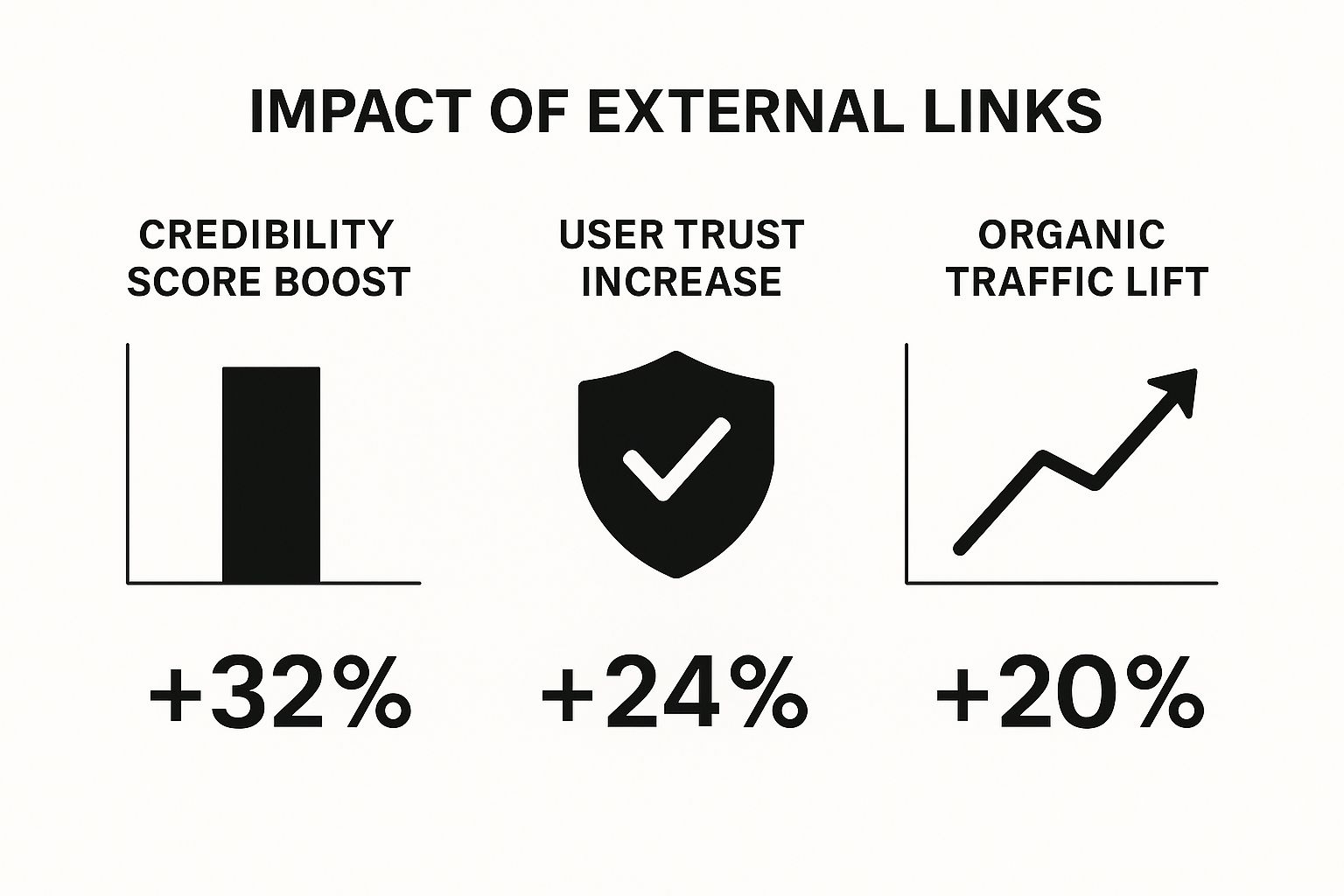
What is an External Hyperlink? Boost Your SEO Strategy
Share
Think of an external hyperlink as a digital signpost on your website that points a visitor to a completely different domain. It’s you, as a website owner, essentially recommending another valuable resource somewhere else on the internet.
Understanding the Role of an External Hyperlink
Let’s use an analogy. Imagine your website is a specialty shop, say, a high-end kitchen supply store. A customer comes in looking for an obscure spice you don’t carry. Instead of shrugging, you recommend the amazing little spice shop just down the street. That recommendation is an external hyperlink.
You're sending your customer (visitor) to another trusted expert. This is a "vote of confidence" telling both your users and search engines like Google that you trust another site's content enough to direct your own audience there. It's a world away from an internal link, which would be like showing that same customer a different aisle within your own store.
The Foundation of a Connected Web
The concept of linking separate documents has been around for a while, first floated by Ted Nelson back in 1965. But it didn't really take off until the World Wide Web became a reality. The web's explosive growth, from just over 600 websites in 1993 to more than 130,000 by 1996, was powered by this simple ability to link one domain to another. For a deeper dive, you can explore more about the history of external links and their massive impact on the early web.
An external hyperlink acts as a bridge between your website and the vast network of information on the internet. It connects your content to the wider digital conversation, enhancing user experience by providing additional context, sources, and resources.

This simple act of linking out is what builds the web of interconnected knowledge we rely on today. It's the very foundation of how search engines discover, understand, and rank content.
To put it simply, here’s a quick breakdown of what makes an external link an external link.
Key Characteristics of an External Hyperlink
| Characteristic | Description |
|---|---|
| Destination | Points to a page on a completely separate domain (e.g., yoursite.com links to anothersite.com). |
| Purpose | To provide additional resources, cite sources, or offer third-party validation for your claims. |
| SEO Signal | Acts as a signal of trust and relevance to search engines when linking to authoritative sites. |
At its core, an external link is all about connecting your site to the broader internet to build credibility and provide more value to your visitors.
Why External Links Are a Big Deal for Your SEO and Credibility

Ever written a research paper in school? Think of an external hyperlink as the digital version of a citation. When you cited a well-respected study, you weren't weakening your paper—you were making it stronger by showing you did your homework.
That’s exactly how search engines like Google see it. Every time you link out to a credible, high-authority website, you’re basically telling Google, "Hey, this source is the real deal, and I’m using it to give my readers the most accurate info I can."
This single act sends a powerful message. For a restaurant equipment supplier, linking to a Food and Drug Administration (FDA) guide on food safety doesn't mean you're losing a customer forever. It actually does the opposite. It shows you're a helpful, knowledgeable resource that cares more about providing value than just trapping visitors on your site.
Build Authority by Association
Using external hyperlinks strategically does more than just back up a claim; it helps build your site's topical authority. When Google's crawlers see you consistently pointing to industry leaders and experts, they start to see you as part of that expert circle.
Think of it this way: by linking to authoritative sources, you're borrowing a piece of their credibility. This makes your readers trust you more and shows search engines that your content is well-researched and a valuable player in your industry's ecosystem.
This isn't just a hunch; it's a widely accepted best practice. In fact, a whopping 89% of SEO professionals agree that referencing authoritative sources is a must-do. Google's algorithms pay close attention to the quality of your outbound links when ranking your pages. You can read more about the impact of external linking on SEO to see the data for yourself.
At the end of the day, a smart external linking strategy creates a natural, healthy link profile that search engines love. And that directly contributes to a stronger presence online. If you want to dive deeper into this, check out our guide on how to build domain authority.
Distinguishing Between Internal and External Hyperlinks
To really get a handle on external hyperlinks, it helps to put them right next to their sibling: internal hyperlinks. The easiest way to think about this is to imagine your website is a book.
Internal links are essentially your book's table of contents. They point readers to other chapters and pages within your own book. Their main job is to help people find their way around your site, discover more of your content, and pass authority—what SEO pros call "link equity"—from one page to another. They're the backbone of a well-organized website.
External links, however, are more like your book's bibliography or footnotes. They send readers to other books in the library—trusted, external sources—to back up a claim, provide extra detail, or cite original research. Their strategic purpose is completely different.
Different Links Different Goals
The goal of an external link isn't to keep someone on your website. Instead, it's about building trust and credibility. When you link out to a well-respected industry study or a manufacturer's official spec sheet, you're essentially telling your readers, "Don't just take my word for it; these experts agree."
This act of citation sends powerful signals to both your audience and search engines like Google, showing that your content is thoroughly researched and reliable.
While internal links keep visitors moving through your own content, external links position your site as a helpful, knowledgeable hub within the broader online community. As you can see below, this has a real, tangible impact.

The takeaway here is that thoughtfully linking to authoritative sources isn't just good practice—it's a direct path to boosting your site's performance by building trust.
Let's break down these differences side-by-side to make it even clearer.
Internal vs. External Hyperlinks A Clear Comparison
This table highlights the fundamental differences between internal and external hyperlinks, showing how they serve distinct but equally important roles in your SEO strategy.
| Attribute | Internal Hyperlink | External Hyperlink |
|---|---|---|
| Destination | A different page on the same domain | A page on a different domain |
| Primary Goal | Site navigation and page authority distribution | Building credibility and providing citations |
| User Action | Keeps the user on your website | Sends the user to another website |
| SEO Impact | Strengthens site architecture and keyword relevance | Signals trust and authority to search engines |
| Analogy | A website's table of contents | A website's bibliography or references |
Both link types are absolutely vital for a well-rounded SEO plan. You can't just focus on one and ignore the other; they work together to create a better experience for users and send the right signals to search engines.
Implementing a Smart External Linking Strategy

Alright, let's move from theory to action. A smart external linking strategy isn’t just about scattering links around your page. It’s about being deliberate and making choices that boost your credibility and give your readers real value. This comes down to picking the right websites to link to and being thoughtful about how you present those links.
The first rule? Quality over quantity, every single time. Linking out to one highly respected authority site is infinitely more valuable than pointing to a dozen irrelevant or low-quality pages. When you link to another site, you're essentially giving it your stamp of approval.
Choosing Your Sources Wisely
Think of yourself as a trusted guide for your customers. To build that trust, your external links should act as signposts pointing toward reliable, authoritative, and truly helpful information.
- Authoritative Sites: Link to the heavy hitters. We're talking about government agencies (like the FDA), respected industry organizations, or well-known educational institutions.
- Relevant Content: Make sure the page you're linking to actually backs up what you're saying. If you're writing about commercial ovens, a link to an official energy efficiency report makes perfect sense. A link to a random home cooking blog? Not so much.
- Non-Competitive Resources: Point your readers to resources that complement your content without sending them straight to a competitor.
A common fear I hear is about "link equity leakage"—the old myth that linking out automatically hurts your SEO. Let's clear this up: it's largely untrue. The trust and credibility you build by citing high-quality sources far outweighs any tiny, perceived downside.
Just look at Wikipedia. The site contains an estimated 50 million external links. Its immense value comes from its power to cite and direct people to authoritative sources, and that’s a model that has built incredible trust. As you build out your own content, remember that earning high authority links for your site is the other side of this coin, strengthening your own profile in the process.
Anchor Text and Link Attributes
How you create the link is just as important as where it goes. You need to use descriptive anchor text—that’s the actual clickable text in your link. Vague phrases like "click here" are a missed opportunity. Instead, use text that clearly tells the user what they'll find, such as "read the FDA’s food safety guidelines."
It's also critical to be transparent. For any paid or sponsored links, use attributes like rel="nofollow" or rel="sponsored". This is a signal to search engines that you have a commercial relationship and that they shouldn't pass authority through that link. Getting this wrong can be as risky as getting caught in shady tactics, so it's vital to understand the difference between good linking and harmful practices like improper link exchanges and their effect on SEO.
Real-World Examples for a Niche Website
Let's get practical and move this from theory into the real world.
Imagine you're writing the ultimate guide for your restaurant equipment blog, something like, "How to Choose the Best Commercial Oven." This is your moment to be more than just a storefront; you can become the go-to resource for anyone in the market.
A thoughtful external linking strategy is what separates a generic product list from a genuinely authoritative guide. Instead of just talking about your ovens, you can use links to bring in outside experts to back up what you're saying. It’s a game-changer for building trust.
Putting Linking Into Practice
For instance, when you get to the part about oven sanitation, why not link directly to the FDA's official page on food safety? That one simple click tells your reader you’re serious about their success and compliance. It’s a powerful signal.
Or, when you're explaining why convection cooking is so great, you could link out to a study from a well-respected culinary school. This adds a layer of unbiased, expert proof to the technology behind the equipment you sell.
By linking to these high-authority domains, you're not just sending people away from your site. You're curating a rich, trustworthy resource that positions you as a knowledgeable hub, not just another online store.
Another great move? Find a recent industry report on energy efficiency in commercial kitchens and link to it. This gives your claims about long-term cost savings some serious, data-driven weight, making your advice far more persuasive.
These external signals are a huge part of how search engines see your site. Learning what is a backlink profile will help you see how all your links—both coming in and going out—build up your reputation.
Plus, building these kinds of helpful, informative articles can open doors for you to write an SEO guest post on another industry site, which is another fantastic way to boost your authority.
Got Questions About External Hyperlinks? We've Got Answers.
When you start digging into external linking, a few practical questions always pop up. It's totally normal. Let's clear up some of the most common ones so you can build your linking strategy with confidence and get the most bang for your SEO buck.
So, How Many External Links Should I Actually Use?
Everyone wants a magic number, but honestly, there isn't one. The real focus should always be on quality and relevance, not just counting links. Think of it this way: add a link when it genuinely helps your reader.
Are you citing a statistic? Backing up a bold claim? Or maybe you're pointing them to a fantastic resource that goes deeper than you have space for. That's the perfect time for a link. For a chunky 2,000-word article, you might naturally end up with anywhere from 5 to 15 really solid, relevant external links. The golden rule is to never force it. Each link should feel like a natural, helpful breadcrumb you're leaving for your reader.
Can Linking Out to Other Websites Hurt My SEO?
It absolutely can, but only if you get sloppy. Linking to a website is like giving it a personal recommendation. If you send your readers to a spammy, low-quality, or completely unrelated site, it reflects poorly on you and can definitely ding your SEO.
The trick is to be picky. Linking out to a trusted source—think a government agency, a well-respected university, or a major industry publication—is a big thumbs-up to search engines. It shows you're a helpful, credible resource that's connected to the wider conversation online.
Just take a second to vet any site before you link to it. A link to a trusted expert builds your authority; a link to a junk site can tear it down.
What’s the Difference Between an Outbound and an External Link?
This one trips people up all the time, but the answer is refreshingly simple. In the world of SEO, "outbound link" and "external link" mean the exact same thing. They both describe a link that points from your website to a page on a totally different domain.
The word "outbound" just highlights the direction—the link is going "out" from your site. So, if you hear someone use either term, don't sweat it. They're talking about the same crucial practice of connecting your content to other valuable resources on the web.
At Restaurant Equipment SEO, we specialize in building powerful content strategies that turn your website into an authoritative industry resource. Discover how our SEO services can help you dominate the search results.